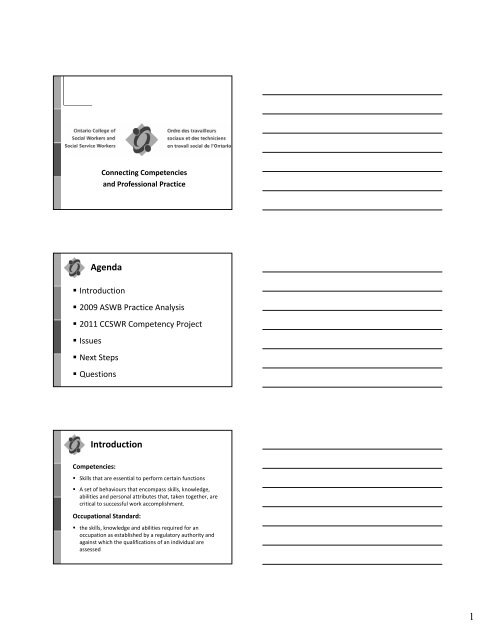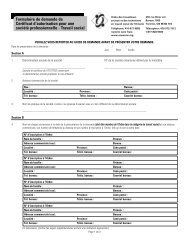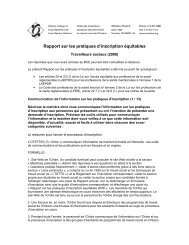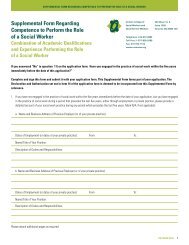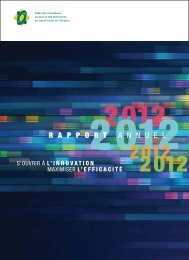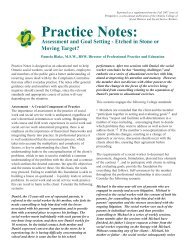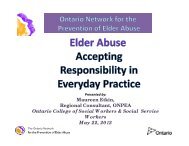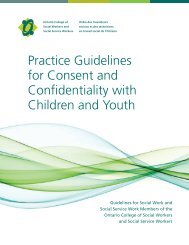Glenda McDonald, RSW, Registrar, OCSWSSW - Ontario College of ...
Glenda McDonald, RSW, Registrar, OCSWSSW - Ontario College of ...
Glenda McDonald, RSW, Registrar, OCSWSSW - Ontario College of ...
You also want an ePaper? Increase the reach of your titles
YUMPU automatically turns print PDFs into web optimized ePapers that Google loves.
Connecting Competenciesand Pr<strong>of</strong>essional PracticeAgenda• Introduction• 2009 ASWB Practice Analysis• 2011 CCSWR Competency Project• Issues• Next Steps• QuestionsIntroductionCompetencies:• Skills that are essential to perform certain functions• A set <strong>of</strong> behaviours that encompass skills, knowledge,abilities and personal attributes that, taken together, arecritical to successful work accomplishment.Occupational Standard:• the skills, knowledge and abilities required for anoccupation as established by a regulatory authority andagainst which the qualifications <strong>of</strong> an individual areassessed1
2009 ASWB Practice Analysis• What: survey to determine minimumknowledge and skills necessary to performsocial work safely at various educational andexperience levels.• Why: to shape the blueprints for the ASWBexaminations• Who: 16,040 North American social workers• When: 2008‐2009, results released 2010Process:2009 ASWB Practice Analysis• 21 subject matter experts review list <strong>of</strong>social work tasks from previous practiceanalysis (Practice Analysis Task Force –PATF)• Pilot study with PAFT Members• Final survey sent to 16,000 Canadian &American social workers2009 ASWB Practice AnalysisProcess (cont’d):• PATF links tasks to exam contentcompetency• Passing Score Panel reviews anchorexaminations to determine pass‐faildeterminations• New content outlines for examinations• New examinations released January 20112
2009 ASWB Practice AnalysisCanadian vs US Respondents:• Response Rate: Canada – 39.3% US – 40.1%• Level <strong>of</strong> Practice:– Canada: Bachelors (53%) Masters (20%)–US: Clinical (43%) Masters (32%)• Practice Setting:– Canada Public Institutions (65%)–US Not‐for‐pr<strong>of</strong>it (43%)2009 ASWB Practice Analysis• Canadian vs US Respondents:• Highest Degree:– Canadians: BSW (53%)– US: MSW (85%)• Practice Field:– Canadians: Mental Health (20%)–US: Mental Health (30%)• Primary Role:–Both: Direct Service Provider (65%)2009 ASWB Practice AnalysisExam Content ResultsContent Bachelors Masters Advanced ClinicalGeneralistHuman 27% 28% 18% 31%DevelopmentDiversity andBehaviour intheEnvironmentAssessment 28% 24% 22% 26%Direct/IndirectPracticeRelationshipsValues & Ethics26% 21% 18% (micro)18% (macro)19% 27% 24% 18%25%(Psychotherapy,Clinical, CaseMgmt)3
2011 CCSWR Competency Project• What: survey to determine entry levelcompetencies for safe social work practice• Why: labour mobility; assessment <strong>of</strong>international social work credentials• Who: 35,000 registered/licensed socialworkers in Canada• When: June 20112011 CCSWR Competency ProjectProcess:• Document review: a review <strong>of</strong> relevant online and printedCanadian documents, reports, websites, and otherpublications produced in English and French since 1995,including some US‐based and international publications• included ASWB Practice Analysis results & CompetencyPr<strong>of</strong>ile developed by Quebec regulatory authority• Developed preliminary list <strong>of</strong> competencies• Reviewed and revised by Steering Committee (5 CCSWRmembers)2011 CCSWR Competency ProjectProcess (cont’d)• Expert Panel Review: 1 panel consisted <strong>of</strong> practitionersfrom across Canada; 2 nd panel consisted <strong>of</strong> all Deans &Directors <strong>of</strong> Canadian social work programs.• List <strong>of</strong> competencies further revised by Steering Committee• Pilot test with CCSWR members• Survey finalized• Survey 35, 000 Canadian registered/licensed social workers• Results expected in early 20124
IssuesCompetence vs Competencies:• Defining competencies represents a de‐pr<strong>of</strong>essionalization<strong>of</strong> the social work pr<strong>of</strong>ession• Competency based approach inconsistent with antioppressivepractice• Reduces key concepts to a series <strong>of</strong> measurable actions• Intellectual knowledge, critical thinking, social justice focusmay be lostIssuesFinancial Imperatives:• Represents a shift in power from social work pr<strong>of</strong>essionals(academics & practitioners) to those holding the pursestrings (e.g. Market driven approach)• Employer’s need for “job‐ready” graduate• Fragments roles into tasks to be completed by a moretechnologically oriented (and less expensive) workforceIssuesMobility and Regulation:• Credential vs Competency Assessment• Transportability <strong>of</strong> credential vs globalize pr<strong>of</strong>essionalstandards• Government requirements: mutual recognition <strong>of</strong>credentials5
IssuesSupport for Competency Pr<strong>of</strong>iles/Frameworks?• Council for Social Work Education• Regulators• American Board <strong>of</strong> Examiners in Clinical SocialWork• Universities (e.g. University <strong>of</strong> Washington)Is the issue how a competency pr<strong>of</strong>ile is understood,constructed and applied that is critical?2011 CCSWR Competency ProjectNext Steps:• Conduct survey: June 2011• Analyze and communicate results• Finalize competency pr<strong>of</strong>ile• Competency pr<strong>of</strong>ile approved by allCanadian Regulatory Authorities as an entryto practice requirementQuestions?6


